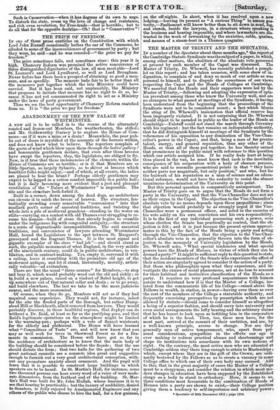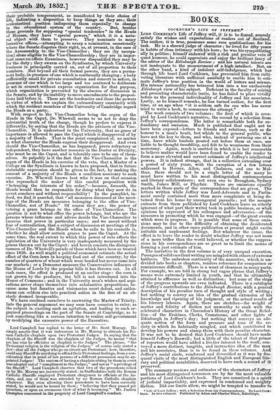THE MASTER OF TRINITY AND THE SPECTATOR. IN a number
of the Spectator about three months ago,* the report of the Cambridge Statute-Syndicate was the subject of a paper, in which, among other matters, the abolition of the absolute veto possessed at present by each member of the Caput was discussed. The Master of Trinity, Dr. Whewell, has recently published a pamph- let on this report; and has taken occasion, with some show of in. dignation, to complain of and deny so much of our article as was personal to himself, and to dispute the correctness of our views respecting the Caput and the Heads of Colleges at Cambridge. We asserted that the Heads and their supporters were led by the Master of Trinity,—following and adopting the expression of opin- ion prevalent among those who know the University well, and are no strangers to what passed at meetings of the Syndicate, it having been understood from the beginning that the proceedings of the Syndicate were not to be considered secret; a fact which blunts the sting of Dr. Whewell's insinuation that official reserve has been improperly violated. It is not surprising that Dr. Whewell should object to be paraded in public as the leader of the Heads at Cambridge—Falstaff could not stand the march through Coventry with his regiment : but the fact remains on indisputable authority, that he did distinguish himself at meetings of the Syndicate by the vehemence of his opposition to any diminution of the Vice-Chan- cellor's power in the Caput; and that, being a man of far greater talent, energy, and general reputation, than any other of the Heads, or than all of them put together, he has thereby earned that prominence in the public mind with reference to this question which our article assigned him. If he really feels hurt at being thus placed in the van, he must know that such is the inevitable consequence of his cooperation with a body of obscure persons, who are said to resemble geometrical points in that "they have neither parts nor magnitude, but only position," and who, but for the bulwark of his reputation as a man of science and an educa- tional reformer, would not have the audacity to resist the almost unanimous determination of the University on this point.
But this personal question is comparatively unimportant. The Master of Trinity goes on to argue that the Heads do not form a party in the University, and that the Vice-Chancellor does not act as their organ in the Caput. The objection to the Vice-Chancellor's absolute veto by no means depends upon these propositions; since that objection would probably be as strongly urged if the Vice- Chancellor were a permanent officer, and acted in the exercise of his veto solely on his own conviction and his own responsibility. It is to the fact of any individual possessing such a power, over whose election the Senate has practically no control, that the ob- jection is felt ; and it is just because the present system approxi- mates to this by the fact of the Heads being a party and acting through the Vice-Chancellor, that the objection to the Vioe-Chan- cellor's absolute veto is so generally thrown into the form of ob- jection to the monopoly of University legislation by the Heads. Dr. Whewell asks, "What special tendencies and what special powers have the Heads of Houses, in virtue of which they can be deemed a party ?" It might be sufficient reply to this question to state, that the resident members of the Senate who experience the effect of their action are singularly agreed to consider it the action of a party. But those who philosophize upon what they experience, and in- vestigate the causes of social phenomena, are at no loss to account for their habitual and instinctive classification of the Heads as a party. It requires no very profound acquaintance with human nature to understand how it is that the Master of a College, iso- lated from the communistic life of his College—raised above the Fellows in wealth, in station, in power—having over them as over the rest of the members of the College a statutable authority, and frequently exercising prerogatives by prescription which are not allowed by statute—should come to consider himself as altogether a being of a superior fashion, and should carry into university and even social arrangements the lofty bearing and the arbitrary claims that he has learnt to look upon as befitting him in the corporation of which he is the head. Then, too, these men have, for the most part, arrived at the summit of their ambition, and are, by a well-known principle, averse to change. Nor are they generally men of active temperament, who, apart from per- sonal considerations, sympathize in the efforts our age is ever making to redress practical abuses and shortcomings and shape its institutions into accordance with its own notions of right. On the contrary, the most active men who are educated at Cambridge seldom stay there long enough to attain to Masterships ; which, except where they are in the gift of the Crown, are ordi- narily bestowed by the Fellows so as to create a vacancy in some College office to which one of their own body may succeed. Add to this, that in the great majority of eases the Master of a College must be a clergyman, and consider the relation in which most mo- dern changes in education have been supposed by the Established clergy as a body to stand to orthodoxy. Here, it seems to us, three conditions most favourable to the combination of Heads of Houses into a party are shown to exist,—their College position giving them a tendency to self-importance and arbitrary power;
• Bpectatiff of 20th December 1821; pate 1214.
their probable temperament, as manifested by their choice of life, indicating a disposition to keep things as they are ; their ecclesiastical position indisposing them especially to change
in the educational system of the country. But, besides these grounds for supposing "special tendencies" in the Heads of Houses, they have "special powers," which it is a natu- ral object with them to preserve. They nominate to many lucrative offices,—attempting to usurp a nomination occasionally where the Senate_ disputes their right, as, at present, in the ease of the .Assessorship to the Vice-Chancellor ; they are (by usurpa- tion) alone eligible to the Vice-Chancellorship ; they are in impor- tant cases ex-officio Examiners, however disqualified they may be for the duty ; they swarm on the Syndicates, by which University business is principally carried on, out of all proportion to their numbers. But beyond all their formal powers, they are a perma- nent body, in presence of one which is continually changing ; a body sufficiently' small for private consultation and concert in action, in presence of-one which is too large and too scattered to deliberate or act in concert -without express organization for that purpose, which organization is prevented by the absence of discussion in the Senate, and by its inability to move amendments to the proposi- tions laid before it. These are the tendencies and these the powers in-virtue of which we explain the extraordinary unanimity with which the resident members of the University of Cambridge regard the Heads as a, party. With respect to the Vice-Chancellor being the organ of the Heads in the Caput, Dr. Whewell seems to us not to deny the substantial truth of the charge, though he prefers to express it diiferently,by. saying that the Heads are the advisers of the Vice- Chancellor. " It is understood in the University, that no grace of importance is allowed to pass the Caput which is disapproved of by a majority of Heads. That is the point complained of, no matter in what character the Heads express their disapproval. And even should the Vice-Chancellor, as has happened, prove refractory or independent, they have another resource in the Doctor of Divinity, who must be on the Caput, and is tolerably sure to be one of them- selves. So palpably is it the fact that the Vice-Chancellor is the organ of the Heads in his exercise of the veto, that a Master of a College on the Syndicate is known to have proposed, that in future statutable expression should be given to the fact, by making the consent of a majority of the Heads a condition necessary to such exercise. Dr. Whewell knows best who it was on that occasion who reproached the maker of this candid proposition with "betraying the interests of his order "—because, forsooth, the Heads would then be responsible for doing what they now do in secret conclave and without responsibility ! In the pamphlet, in- deed, we find it asserted, that "all measures discussed at the meet- ings of the Heads are measures belonging to the office of Vice- Chancellor, not of Heads.", Of, course they are ; the power of vetoing a grace belongs .to the -office of Vice-Chancellor. The question is not to what office the power belongs, but who are the persons whose influence and- advice decide the Vice-Chancellor to exercise that power in particular cases; and we assert without fear of contradiction, that a subject of discussion at meetings of the Vice-Chancellor and the Heads whom he calls to his councils is, whether he shall-allow certain graces to pass the Caput. At the same time, the real extent to which this power of veto affects the legislation of the University is very inadequately measured by the graces thrown out by the Caput : and herein consists the disingenu- ousness of Dr.,Whewell's parade of those which have been so treated since 1828. As well might a political economist estimate the actual effect of the Corn-laws m keeping food out of the country, by the number of quarters of wheat which were bonded but never came into oar markets ; or a Democrat measure the Conservative influence of the House of Lords by the popular bills it has thrown out. In all such cases, the effect is produced at an earlier stage : the corn is not grown by the producer, the bill is not introduced into the House of Commons ; and in the University men's wishes and aspi- rations never shape themselves into substantive propositions, be- cause none but fanatics and 'visionaries court defeat, and enthu- siasm can seldom rise into practical action in the face of an ob- stacle deemed insuperable.
We have confined ourselves to answering the Master of Trinity. Into the general argument we may soon have occasion to enter, as the subject is exciting such an agitation and leading to such or- ganized proceedings on the part of the Senate at Cambridge, as to look something like a serious intention to realize self-government by modifying the excessive power of the Executive.



























 Previous page
Previous page